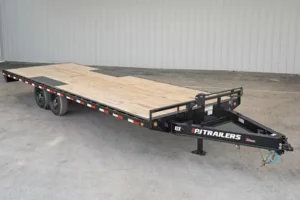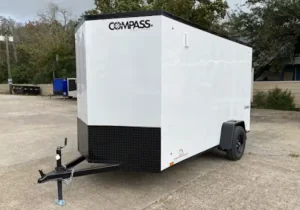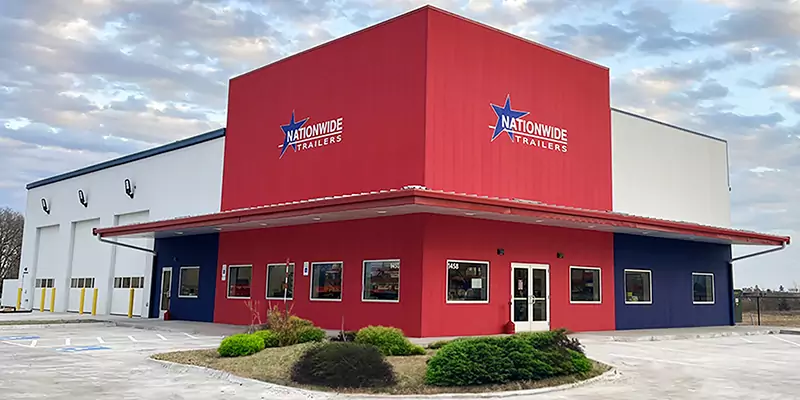Heavy lifting causes about 30% of work-related injuries. Keep you and your crew safe by choosing a trailer that makes it safe and easy to get heavy equipment onto it. There are several heavy equipment trailers to choose from that will fit the equipment you’re hauling and the trucks you have available to pull them.
1. Tilt Trailers
Tilt trailers are a great option for hauling heavy equipment because they allow you to easily load it onto the trailer without needing a ramp for leverage. The trailer itself essentially turns into a ramp, so you no longer need to worry about hauling and storage for a separate ramp.
Many tilt trailers have hydraulic lifts and jacks that help you load heavy equipment onto them with ease. The edge of the trailer will shift to the ground so you can slide the equipment on rather than lift it.
2. Flatbed Trailers
Flatbed trailers are a common choice for hauling construction equipment. Flatbeds come with single or dual wheels with a variety of coupler options such as Gooseneck, Bumperpull or Pintle. They can be made from of a variety of materials, including composite, steel and aluminum.
One of the biggest benefits of a flatbed is the level surface, which can easily hold heavy equipment. On the other hand, the trailer does not tilt down like a tile trailer, so you have to load it using a crane, forklift or some other form of machinery or have it pulled up to a loading dock so it is level with the ground.
3. Hotshot Trailers
Hotshot trailers are a form of flatbed trailers you can pull with a pickup truck. Quality hotshot trailers have hydraulic brakes, 12K axles, air-ride suspension and torque tubes. The goal of hotshot trailers is to provide versatility and durability for users so they know their equipment is safe.
4. Dump Trailers
Dump trailers are perfect for hauling debris and various forms of heavy equipment. They come in many sizes but tend to be larger than other forms of trailers.
Some dump trailers are frameless while others are framed, and both have some pros and cons:
- Framed dump trailers: Framed dump trailers are best for tight spaces because the frame acts as a funnel for the debris when it is transferred. Many trucks can pull framed trailers, while frameless trailers require trucks with modifications. The frame adds weight to the trailer, which means you may not be able to haul quite as much as you would without it. Choosing the right trailer material can make the base lighter to make up for the heavy frame.
- Frameless dump trailers: Frameless trailers eliminate the issue of adding weight to the frame so you can haul heavier loads. They require more room to dump since there’s nothing filtering the debris.
Dump trailers come in different materials that provide other benefits and challenges:
- Aluminum: Aluminum is a lighter material, making it a great option for framed dump trailers that have added weight because of the frame. This material is best for trailers that are often hauling soft materials such as gravel, sand and dirt.
- Steel: Steel trailers are a better option for hauling tougher materials like concrete and stone.
5. Step Deck Trailers
Step deck trailers are a larger version of flatbed trailers you can adjust to specific equipment dimensions. They have a ramp so you can easily get your load on without needing extra equipment. These trailers are best for mid-sized equipment such as forklifts, mini excavators, trenchers and skid steers.
6. Lowboy Trailers
The lowboy trailer is named for its deck’s ability to lower more than most other trailers can. This allows your equipment to easily roll on and off of the trailer without extra equipment. The low platform allows the equipment to make it under bridges or other overhead obstructions.
These trailers are specifically designed to hold the largest kinds of equipment that cannot be broken down into smaller pieces or loads, such as excavators and dozers. They often carry loads that require extra permits and permissions since they are so large.
Tips for Hauling Construction Equipment
Once you’ve picked the right trailer, there are still several points you need to know about hauling heavy equipment to make it a safe and efficient process.
Determining the capacity of your trailer and load takes more than simple measurements. There are capacity factors you should take into consideration when choosing a trailer:
- Size and weight: Take inventory of your haul and determine how much physical space it’ll take up. It’s also important to determine how heavy it is, as different trailers have different weight requirements.
- Trailer’s ability: Once you have the size and weight of your haul, compare that to what the trailer can hold. Give yourself a little wiggle room so you can haul extra equipment when necessary.
- Deck area: Trailers have a certain area of the deck where all weight should be centralized. Any weight placed outside of this area could cause maneuverability issues for the trailer and won’t be as safe. Make sure you take this into account so you’re not planning to haul more than the trailer can safely carry.
- Optimal travel speed: When hauling a load for a long distance, you should be aware of the optimal travel speed and route for the trailer to safely pull the equipment.
You most likely know the capacity of the haul you need the trailer to hold before you choose one. However, it’s crucial to keep in mind that there will be situations where you’ll be hauling more or less than what you normally haul.
Find the Right Trailer for You at Nationwide Trailers
Nationwide Trailers has a wide variety of heavy-duty trailers for construction equipment so you can find the one that’s right for your haul. Our expert team is here to answer all of your questions. We can narrow down the best options for your applications so you can focus more on your day-to-day.
Hauling construction equipment should be a simple part of your tough job. Contact us today and we’ll help you find what you need!






